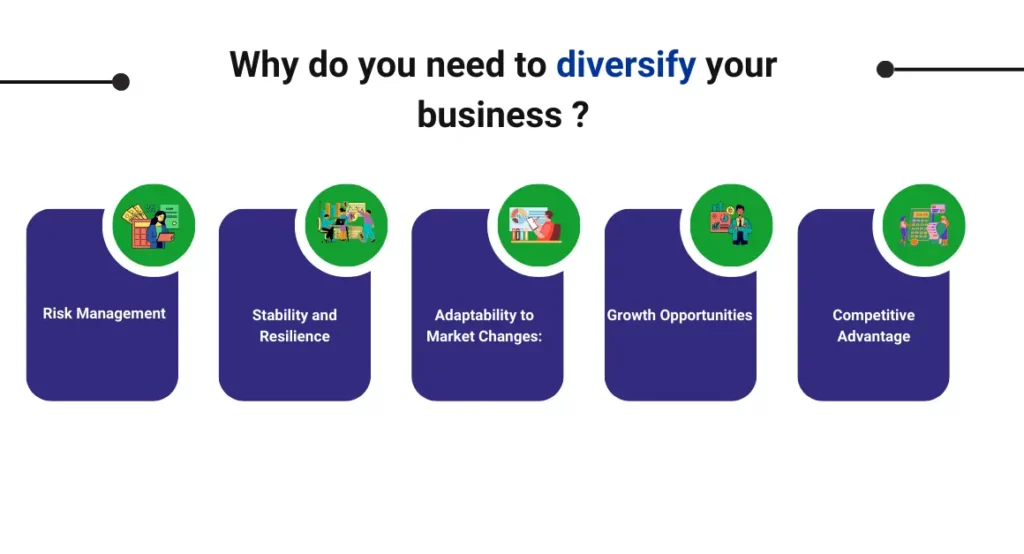Introduction
The Government of India established MSME (Micro, Small, and Medium Enterprises) through the MSMED Act, 2006, managed by the Ministry of MSME. These businesses, mainly in production and manufacturing, receive government support to operate smoothly in local and global markets. The List of 150 Profitable Business Ideas for MSME offers a wide array of suitable ventures across manufacturing and technology sectors, aiming to inspire and assist entrepreneurs in setting up successful enterprises within the MSME realm. Historically, starting a business was tough due to limited resources and high risks, often necessitating significant savings or loans with high interest rates, amid inadequate support from family and government. So in this blog we will discuss the list of 150 profitable business Ideas for MSME.
The Need for Diversification in Business
Diversification in business is like not putting all your eggs in one basket. It means spreading out your investments, products, services, and risks across various areas. This strategy helps to reduce the impact of potential losses in any single area and can enhance overall stability and resilience. By diversifying, businesses can navigate through economic fluctuations, changing consumer demands, or disruptions in specific industries more effectively. It also enables them to explore new opportunities and expand their reach into different markets or industries. Overall, diversification is a key strategy for managing risk and promoting long-term growth and sustainability in business.
Why do you need to diversify your business?

- Risk Management: By spreading your investments, products, services, and operations across different areas, you reduce the impact of potential losses in any single segment. This helps protect your business from the adverse effects of market fluctuations, changes in consumer behavior, or industry-specific disruptions.
- Stability and Resilience: Diversification enhances the overall stability and resilience of your business. When one area of your business faces challenges, other diversified areas can continue to generate revenue and support the overall operation.
- Adaptability to Market Changes: Markets are dynamic and constantly evolving. Diversification enables your business to adapt more effectively to changing market conditions, consumer preferences, and industry trends. It allows you to pivot and capitalize on new opportunities as they arise.
- Growth Opportunities: Diversification opens up new avenues for growth. It allows you to explore different markets, industries, and customer segments, thereby expanding your customer base and revenue streams. This can lead to increased profitability and long-term sustainability.
- Competitive Advantage: A diversified business is often better positioned to compete in the marketplace. It can offer a broader range of products or services, cater to diverse customer needs, and differentiate itself from competitors who may be more focused on a single niche.
Market Research Essentials
Market research is vital for Indian MSMEs considering diversification or starting a new venture. Conducting thorough market research provides crucial insights into various aspects of the business landscape, ensuring informed decision-making and mitigating risks.
Here’s why do you need to do market research:
- Understanding Local Market Dynamics: Market research helps MSMEs gain insights into the specific dynamics of the Indian market, including regional variations, cultural influences, and consumer preferences.
- Identifying Market Gaps: Thorough market research enables MSMEs to identify gaps or unmet needs in the market, providing opportunities for innovation and differentiation.
- Tailoring Products or Services: By understanding consumer needs and preferences, MSMEs can tailor their products or services to meet specific demands effectively, increasing their competitiveness in the market.
- Analyzing Competitors: Market research allows MSMEs to analyze competitors, including their strengths, weaknesses, and strategies. This insight helps MSMEs develop competitive advantages and positioning strategies.
- Mitigating Risks: By conducting thorough market research, MSMEs can assess market risks and make informed decisions, reducing the likelihood of failure or loss.
- Identifying Growth Opportunities: Market research helps MSMEs identify growth opportunities, including emerging trends, untapped market segments, and potential partnerships or collaborations.
- Informing Business Strategy: Market research provides valuable data and insights that inform strategic decision-making, such as product development, pricing strategies, marketing campaigns, and expansion plans.
Also Read: Unlocking Potential: 10 Key Tools To Skyrocket Your Business
Leveraging Digital Transformation
Leveraging digital transformation is crucial for businesses, especially MSMEs, to stay competitive and thrive in today’s digital age. Technology enables MSMEs to streamline operations, improve efficiency, and reach wider audiences. By embracing digital tools and platforms, MSMEs can enhance productivity, reduce costs, and adapt to changing market dynamics more effectively.
Here’s some points discuss the need of leveraging digital transformation:
- Enhancing Operational Efficiency: Digital transformation involves adopting technology to streamline business processes and operations. MSMEs can leverage digital tools such as project management software, cloud-based storage solutions, and automated workflows to improve efficiency and productivity.
- Expanding Market Reach: Digital platforms offer MSMEs the opportunity to reach wider audiences beyond their local markets. By establishing an online presence through websites, e-commerce platforms, and social media channels, MSMEs can access global markets and attract customers from diverse geographic locations.
- Improving Customer Engagement: Digital transformation enables MSMEs to enhance customer engagement and satisfaction. Through personalized communication, targeted marketing campaigns, and responsive customer service channels, MSMEs can build stronger relationships with their customers and address their needs more effectively.
- Adapting to Changing Consumer Behavior: In today’s digital age, consumer behavior is constantly evolving. MSMEs need to stay agile and responsive to these changes to remain competitive. Digital transformation allows MSMEs to gather and analyze data on consumer preferences, trends, and behavior, enabling them to adapt their products, services, and marketing strategies accordingly.
- Enabling Innovation and Creativity: Digital tools and technologies open up new avenues for innovation and creativity within MSMEs. Whether it’s developing new products, services, or business models, or implementing innovative marketing strategies, digital transformation empowers MSMEs to stay ahead of the curve and differentiate themselves in the market.
- Reducing Costs and Overheads: Adopting digital solutions can help MSMEs reduce costs and overheads associated with traditional business operations. For example, cloud computing services eliminate the need for expensive hardware infrastructure, while digital marketing strategies often offer a more cost-effective alternative to traditional advertising methods.
- Staying Competitive in the Digital Age: In today’s hyper-connected and technology-driven business landscape, digital transformation is essential for MSMEs to stay competitive. By embracing digital technologies and innovation, MSMEs can position themselves as industry leaders and stay ahead of competitors who may be slower to adapt to digital change.
Service-Based Business Ideas

You might be aware of a few of the service based business ideas such as: Digital Marketing Agency, IT Consulting Services, Financial Advisory Services, Content Writing and Copywriting Services, Event Planning and Management, Educational Tutoring Services, Travel and Tourism and many more. Here we will discuss few innovative ideas:
- Customized AI Chatbot Development: Create AI-powered chatbots tailored for specific industries such as e-commerce, healthcare, and hospitality. These chatbots can provide personalized customer support, product recommendations, and booking assistance, improving customer engagement and satisfaction while adhering to data protection regulations.
- Blockchain-based Supply Chain Management: Develop blockchain solutions for supply chain transparency, traceability, and authentication across industries like agriculture, pharmaceuticals, and logistics. Provide end-to-end supply chain management services, ensuring product quality, safety, and compliance with regulatory standards and certifications.
- Remote Healthcare Monitoring Devices: Develop IoT-enabled healthcare monitoring devices and platforms for remote patient monitoring, chronic disease management, and elderly care. Offer subscription-based services that provide real-time health data analysis, alerts, and personalized recommendations, empowering individuals to manage their health proactively while complying with healthcare regulations and privacy laws.
- Digital Transformation Consulting for Traditional Industries: Provide consulting services to traditional industries such as manufacturing, agriculture, and retail on implementing digital transformation strategies. Offer expertise in areas such as IoT integration, data analytics, automation, and e-commerce adoption, helping businesses modernize their operations and stay competitive in the digital age while complying with industry regulations and standards.
- AI-driven Personalized Learning Platforms: Create AI-powered personalized learning platforms that adapt to each student’s learning style, pace, and preferences. Offer interactive educational content, assessments, and progress tracking tools for students of all ages and academic levels, supporting personalized learning journeys while adhering to educational standards and regulations.
Also Read: 5 MSME Startup Ideas: Create Your Dream Of Business
Product-Based Business Ideas
- Smart Home Automation Devices: Create smart home devices like thermostats, lights, cameras, and locks. Make them customizable and easy to connect with existing home systems. This lets homeowners control their homes from their phones or with voice commands.
- Green Energy Solutions: Design and manufacture green energy solutions such as solar-powered gadgets, portable wind turbines, and energy-efficient appliances. Offer eco-friendly alternatives to traditional energy sources, helping consumers reduce their carbon footprint and save on energy costs while promoting sustainability and environmental conservation.
- Smart Agriculture Technology: Develop and market smart agriculture technology solutions for small-scale farmers and rural communities. Offer products such as soil moisture sensors, crop monitoring drones, and automated irrigation systems that improve farm productivity, reduce water usage, and optimize resource management for sustainable agriculture practices.
- Modular Furniture and Space-Saving Solutions: Design and manufacture modular furniture and space-saving solutions for urban dwellers and small homes. Create multifunctional furniture pieces such as foldable tables, convertible sofas, and wall-mounted storage units that maximize living space and offer versatility and functionality without compromising on style or comfort.
Also Read: Small Business, Big Returns: The Top 10 Profitable Ideas For Micro And Small Business In 2024
Tech-Driven Ventures
Tech-driven ventures are businesses that center their operations, products, or services around technology or innovative technological solutions. These ventures leverage advancements in technology to create, deliver, or enhance their offerings, catering to various market needs and opportunities. Here’s a detailed breakdown of some key aspects of tech-driven ventures:
- Focus on Technological Innovation: Tech-driven ventures prioritize innovation in technology, utilizing advancements to address market needs and opportunities effectively.
- Diverse Fields of Operation: Operating across various sectors like software development, digital marketing, IoT, and AI, these ventures offer specialized solutions tailored to different industries.
- Software Development and App Creation: Specializing in creating custom software and mobile apps, these ventures deliver tailored solutions for business and consumer needs.
- Digital Marketing and Online Advertising: Offering services like SEO, social media marketing, and PPC, these ventures leverage data and automation for effective online campaigns.
- Internet of Things (IoT) Solutions: Developing IoT ecosystems for smart homes, cities, and industries, these ventures improve efficiency and productivity through data-driven automation.
- Artificial Intelligence (AI) and Machine Learning (ML): Leveraging AI technologies like ML and NLP, these ventures develop intelligent systems for data analysis, virtual assistants, and personalized recommendations.
- Focus on Customer Experience and Innovation: Prioritizing exceptional experiences and continuous innovation, these ventures drive value by meeting evolving customer needs and preferences.
Conclusion
In conclusion, exploring profitable business ideas for MSMEs involves understanding the need for diversification, conducting thorough market research, and leveraging digital transformation. Service-based and product-based ventures offer avenues for growth, while tech-driven ventures harness innovation to meet evolving market demands. By embracing these strategies, MSMEs can thrive in today’s competitive landscape and achieve long-term success.
FAQ’s
-
What is the significance of diversification in business?
- Diversification helps MSMEs spread risk and seize new opportunities, ensuring resilience and long-term growth.
-
How can MSMEs conduct effective market research before starting a business?
- MSMEs can conduct market research by analyzing consumer needs, studying competitors, and identifying market gaps to inform their business decisions.
-
What are the benefits of leveraging digital transformation for MSMEs?
- Digital transformation helps MSMEs improve efficiency, reach wider audiences, and stay competitive in the digital age.
-
Can you provide examples of service-based business ideas suitable for MSMEs?
- Service-based business ideas for MSMEs include digital marketing agencies, IT consulting services, and event planning and management firms.
-
What are some innovative product-based business ideas tailored for MSMEs?
- Innovative product-based business ideas for MSMEs include smart home automation devices, personalized health and wellness products, and green energy solutions.
-
How do tech-driven ventures differ from traditional business models?
- Tech-driven ventures rely heavily on technology and innovation to create value and drive growth, whereas traditional businesses may have more conventional approaches.
-
What factors should MSMEs consider when choosing a business idea?
- MSMEs should consider market demand, competition, scalability, and their own capabilities and resources when choosing a business idea.
-
Are there any legal or regulatory considerations MSMEs need to be aware of?
- MSMEs should ensure compliance with local laws, regulations, and industry standards relevant to their business operations and activities.
-
How can MSMEs stay competitive in today’s market with limited resources?
- MSMEs can leverage innovation, technology, strategic partnerships, and effective marketing strategies to stay competitive despite resource constraints.
-
What are the key takeaways for MSMEs looking to explore profitable business opportunities?
- MSMEs should focus on diversification, market research, digital transformation, and innovation to identify and capitalize on profitable business opportunities in today’s dynamic market.
